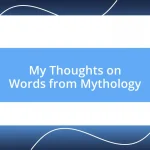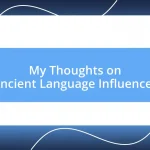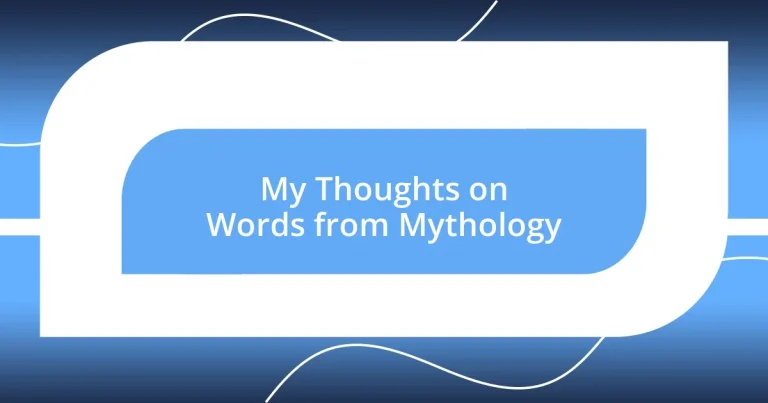Key takeaways:
- Mythological words, such as “Nemesis” and “Pandora,” enrich our vocabulary and connect us with ancient narratives, reflecting timeless human experiences.
- Language in mythology serves as a bridge to wisdom, with terms like “kledon” and “Achilles’ heel” emphasizing personal reflection, cultural relevance, and moral lessons.
- Incorporating mythological references in everyday life and discussions fosters deeper connections and critical thinking, making ancient stories relevant to contemporary experiences.
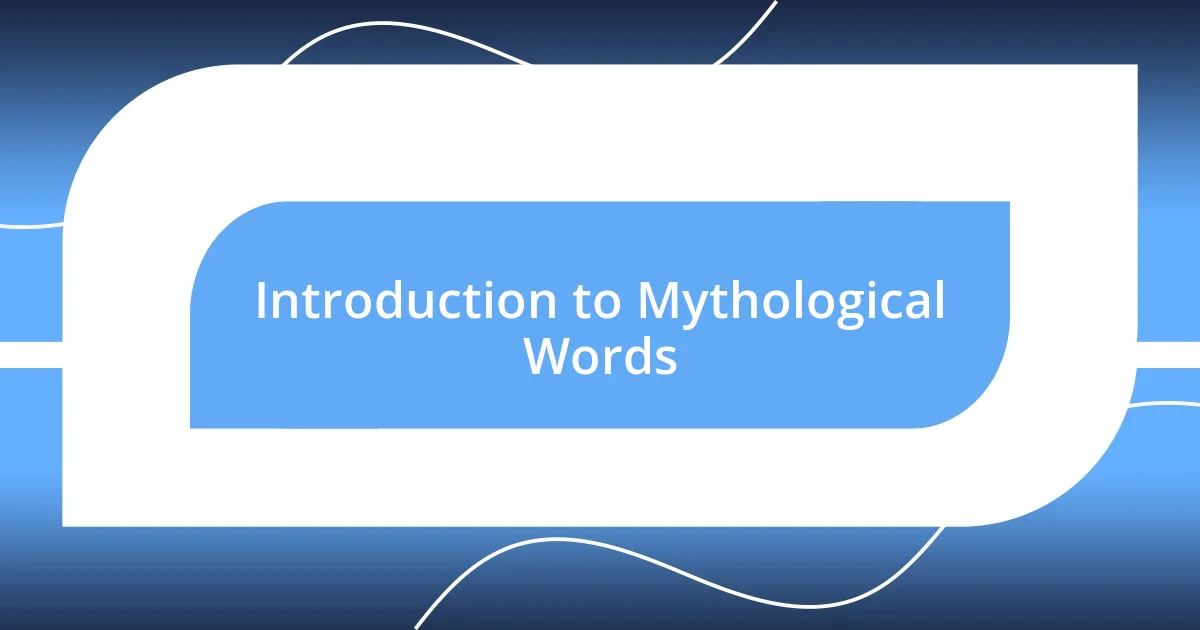
Introduction to Mythological Words
Mythological words carry a weight that resonates deeply within our culture and language. Each term is steeped in stories of gods, heroes, and ancient beliefs, sparking curiosity and wonder. Have you ever paused to think about how these words shape our understanding of the world?
For me, encountering words like “Nemesis” or “Pandora” evokes a vivid sense of history and emotion. I remember the first time I learned about Pandora’s box; it felt like I was uncovering a hidden truth about human nature. These terms serve as gateways to ancient tales, which remind us of our shared human experience, both uplifting and cautionary.
When I hear “siren,” I often reflect on its dual meaning—both a warning and an alluring call. It’s fascinating how one word can represent both danger and temptation, don’t you think? Exploring mythological language not only enriches our vocabulary but also offers profound insights into the archetypes that continue to influence our lives today.
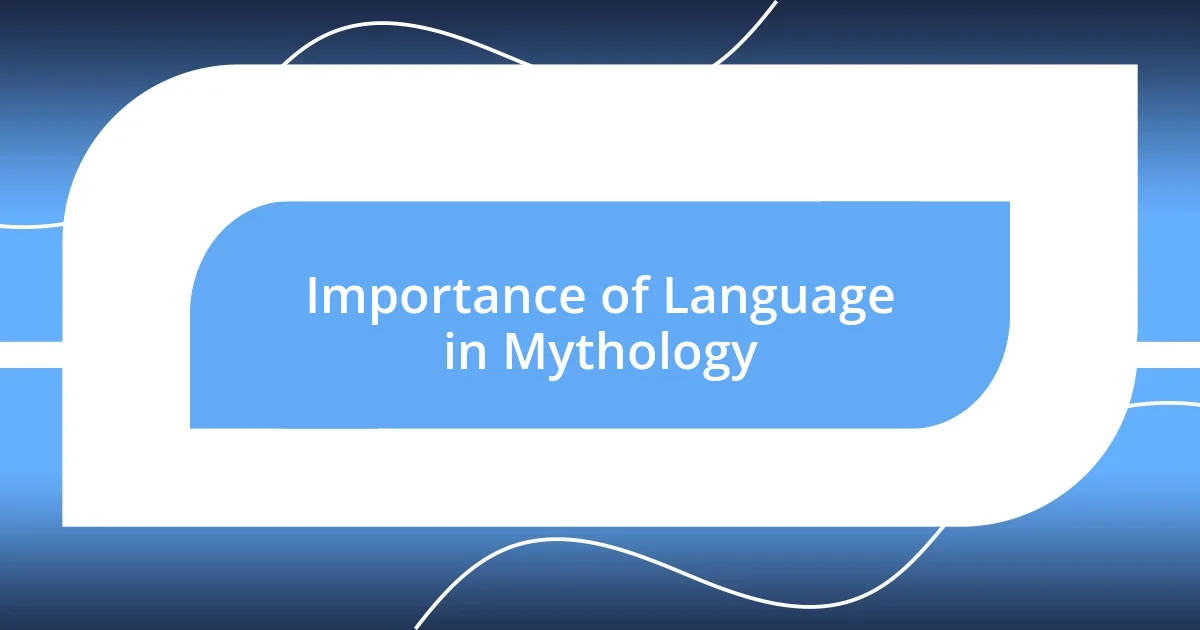
Importance of Language in Mythology
Language in mythology serves not just as a medium of communication but as a bridge connecting us to the wisdom of ancient civilizations. Each word encapsulates narratives that inform us about morals, values, and the human condition. For example, when I first encountered the term “kledon”—which refers to an oracle’s utterance—I felt an inexplicable connection to the voices of the past. It made me ponder how much we’ve relied on language to seek guidance and understanding across generations.
Moreover, mythology often uses language symbolically, allowing words to resonate on multiple levels. Think about how the word “hero” not only describes a brave figure but also embodies qualities we aspire to uphold in our own lives. I remember discussing this in a book club, and everyone had a different interpretation based on their experiences. That’s the beauty of mythological language; it sparks personal reflection and group discussion, revealing our diverse perspectives influenced by shared stories.
As I delve deeper into this subject, I can’t help but feel a sense of awe at the power of language in shaping our cultural consciousness. Consider how terms like “Achilles’ heel” have entered modern vernacular, emphasizing vulnerability. It’s intriguing to see how these ancient words continue to find relevance today, reminding us that the lessons of mythology are timeless and ever-present in our language.
| Aspect | Example |
|---|---|
| Language as a Connector | “Kledon” symbolizes seeking wisdom |
| Symbolism in Terms | “Hero” reflects personal aspiration |
| Cultural Relevance | “Achilles’ heel” signifies vulnerability |
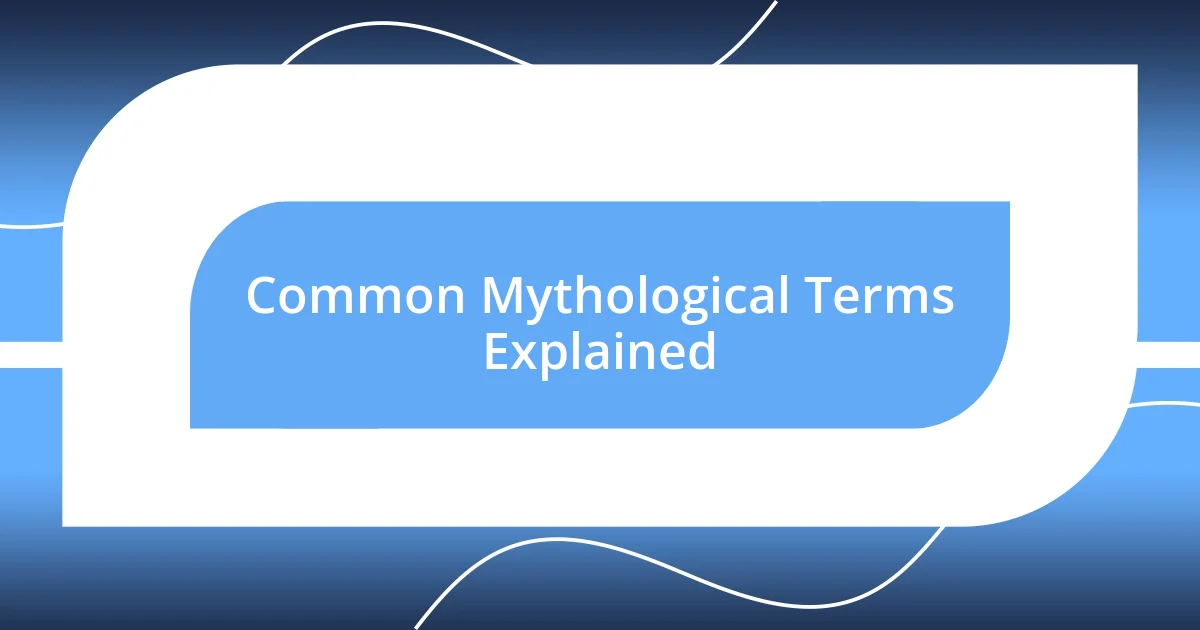
Common Mythological Terms Explained
Common mythological terms often carry layers of meaning beyond their literal definitions, echoing centuries of storytelling. I remember first hearing the word “Labyrinth” and feeling a sense of intrigue about the complexity it represents, both in Greek mythology and in our own lives. It’s relatable; we often find ourselves navigating our own labyrinths filled with choices and challenges. Words like these illustrate how mythology can mirror our human experiences.
Here are a few key terms to explore:
- Mythos: Refers to a traditional or legendary story, often explaining natural or social phenomena.
- Chimera: A creature made up of the parts of different animals; it symbolizes impossible dreams.
- Fate: In mythology, typically represented as a predetermined path; it often sparks debates on free will versus destiny.
- Titan: Represents great strength or size; derived from the formidable beings in Greek mythology.
- Elysium: Refers to the final resting place of heroes and virtuous souls; it embodies the concept of paradise in the afterlife.
Each term has its own story, waiting to be uncovered. Reflecting on these words reminds me of how the challenges and aspirations we face today resonate powerfully with those of mythological figures, connecting our past to the present.
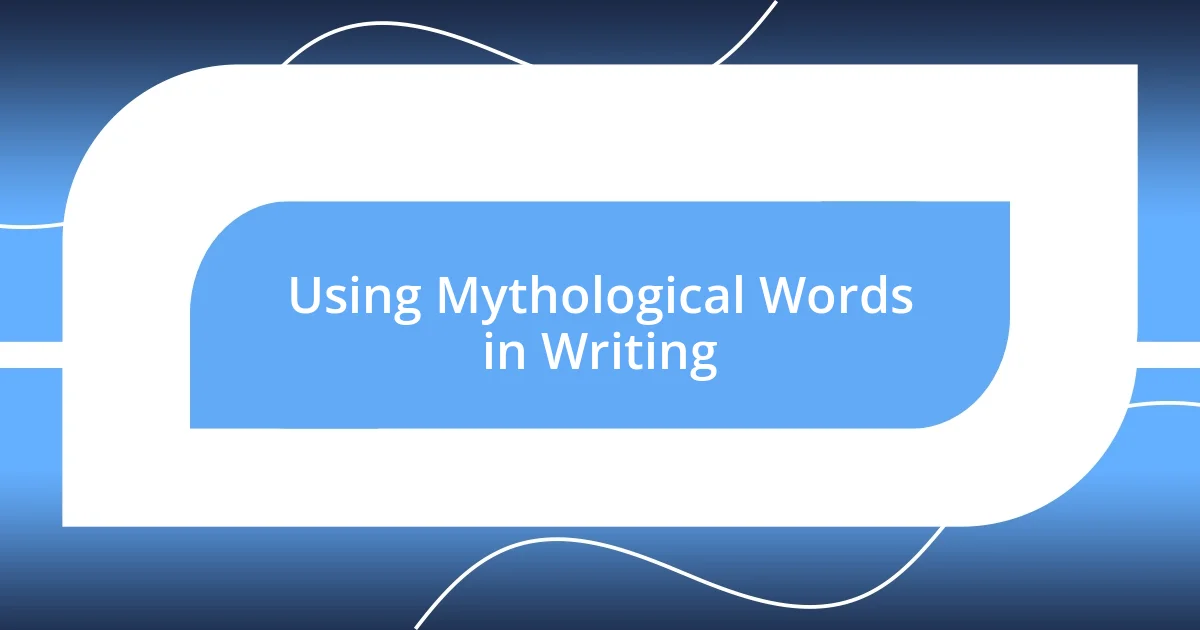
Using Mythological Words in Writing
When I incorporate mythological words into my writing, I often find they add a layer of depth that resonates with readers. For instance, using the term “Pandora’s box” in a story not only invokes the image of curiosity but also the unforeseen consequences that come with it. I can’t help but wonder: does this enrich the text, or does it risk alienating readers who might not be familiar with the myth? Personally, I’ve witnessed how such references can spark interest and prompt discussions, illuminating historical contexts that readers may have overlooked.
Using mythological terms provides an opportunity for exploration. When I mentioned “Sisyphus” in a conversation, it transformed from a mere name into a metaphor for our daily struggles. Isn’t it fascinating how a single word can evoke feelings of frustration and resilience simultaneously? For me, this duality is essential when writing. It draws readers in, inviting them to reflect on their own experiences while contemplating timeless tales.
Moreover, weaving in these words allows a connection with universal themes. Words like “Nemesis” or “Odyssey” don’t just belong to ancient texts; they echo our journeys through life, filled with challenges and the pursuit of justice. The first time I described a setback as an “odyssey,” it resonated deeply with my audience. I realized then that mythological vocabulary acts as a bridge, linking personal stories with those of legendary heroes and heroines. Isn’t that what we’re all searching for—to find our stories within the grand narrative of humanity?
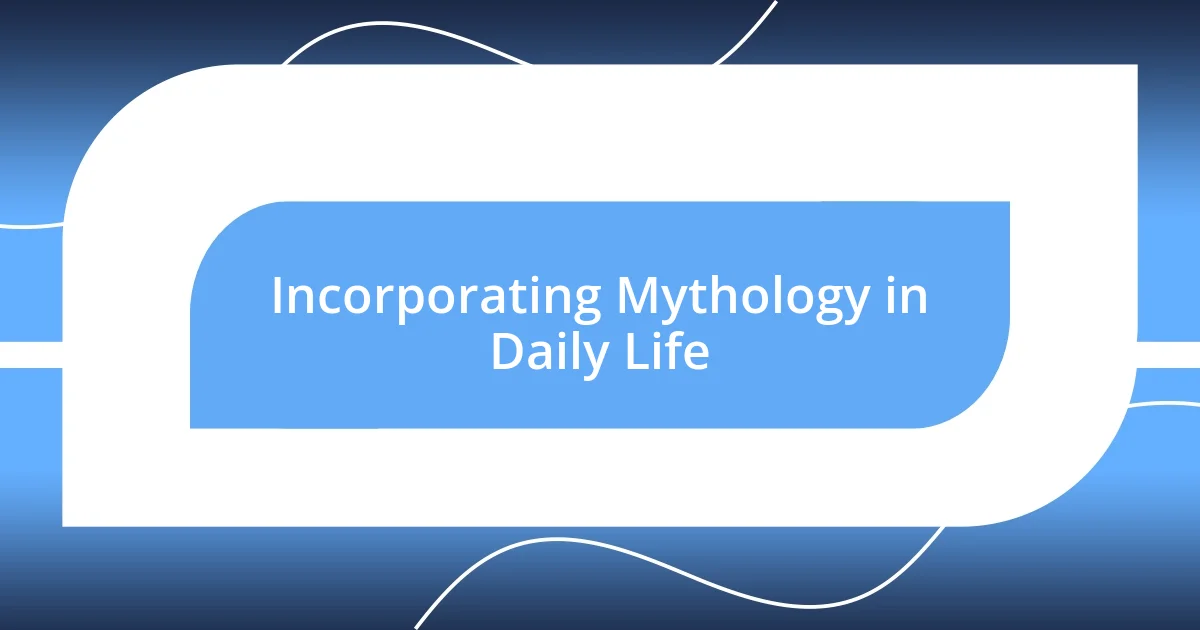
Incorporating Mythology in Daily Life
As I weave mythology into my daily routine, I often find myself drawing inspiration from its rich narratives. For example, during a particularly challenging week, I recalled the story of Persephone and her journey between the underworld and the world above. This reflection helped me appreciate the cycles of struggle and joy in my own life, reminding me that tough times often lead to personal growth. How often do we overlook our own journeys, missing the beauty in the transitions we experience?
In conversations, I occasionally use mythological references to draw parallels with contemporary issues. The term “Promethean” comes to mind when discussing innovation and ambition. I remember a spirited debate with friends about the ethics of technology, where I described a breakthrough as both visionary and dangerous—just like Prometheus stealing fire from the gods. This connection not only sparked dialogue but also encouraged my friends to think critically about the implications of our advancements. It’s incredible how these ancient stories continue to resonate with us and provoke thought.
I also find joy in incorporating mythology into everyday activities, like naming my plants after mythological figures. While watering my “Hera,” I reflect on the strength of women throughout history and how these narratives shape our understanding of femininity today. It makes me wonder: how does assigning these names inform my connection to them? It’s moments like these that make mythology a living part of my life, serving as a reminder of the wisdom woven through our collective history.
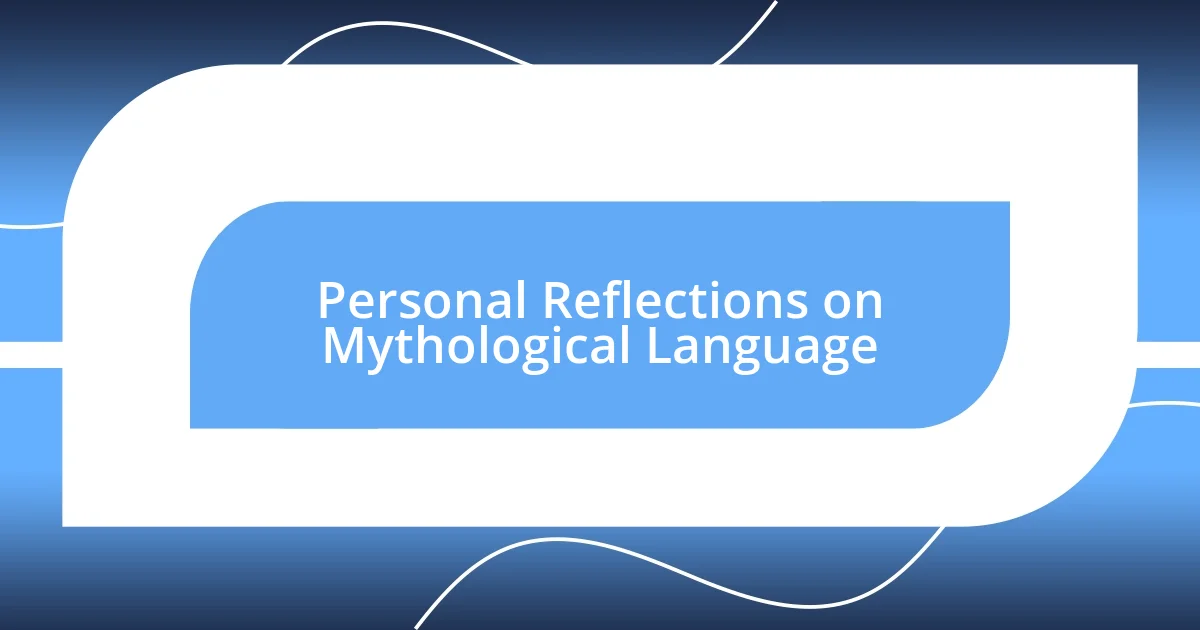
Personal Reflections on Mythological Language
When I think about mythological language, I can’t help but appreciate its evocative power. I remember introducing the term “Achilles’ heel” during a discussion about vulnerabilities in leadership. It struck me how everyone instantly grasped the concept; it painted a vivid picture of strength intertwined with inherent weaknesses. Is there anything more captivating than finding a single phrase that can encapsulate so much depth and complexity?
I also enjoy the moments when mythological references spark unexpected laughter or reflection. The first time I explained the term “Herculean effort” after a friend shared their ambitious project, seeing their eyes light up with recognition was rewarding. It made me realize that even in jest, these words can bridge gaps, making narratives relevant to our lives today. Why do we resonate with these ancient tales so strongly? I believe it’s because they touch on our shared human experience, and in those moments, we find common ground.
While reading classic literature, I often reflect on the mythological concepts that shape our understanding of time and fate. Recently, I revisited the tale of the Fates while contemplating life’s unpredictability. The idea that our paths are woven by invisible hands reminds me of my own journey, dotted with unexpected twists. It encourages me to embrace uncertainty rather than fear it. Isn’t it empowering to think that, like these mythical characters, we too can be both the storytellers and the stories themselves?








